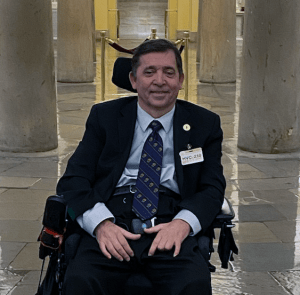Paralyzed Veterans of America continues the fight for healthcare
By Charles Brown / PVA National President
Paralyzed Veterans of America (PVA) was founded in 1946 on the principles of creating the best spinal-cord injury and disorders (SCI/D) program for soldiers returning from war — and those to come after.
PVA has fought for appropriate health care, universal accessibility, earned military benefits through service and numerous areas that help improve individuals’ quality of life.
It’s amazing to me that this is a cyclical action that happens throughout the Department of Veterans Affairs (VA) and that PVA’s 76 years of contributions have assisted.
When PVA was first forming, we were told by other veterans service organizations (VSO) that they wouldn’t support us because it would be costly and taxing to the VA health care system. PVA fought through those early battles and succeeded in becoming one of the premier VSOs, representing some of this nation’s most catastrophically injured veterans.
In 1970, Life magazine published an article about the horrible conditions veterans had to endure at the Bronx VA. Unfortunately, within today’s environment, we find ourselves in similar positions. While some of them aren’t as egregious as those terrible conditions, they are nonetheless damaging to the veterans who are staying on the units.
We’re facing staffing shortages, dirty rooms, closed beds and even completely closed units. It seems to me that the lessons of the past are quickly forgotten and that the VA and Congress are underfunding a system of care that’s needed for so many catastrophically disabled veterans.
I was injured on June 11, 1986. As I was stabilized in a community hospital, I was given a choice on where I could go for rehabilitative care. A dear friend of the family told me the VA would be best because it had the most outstanding SCI/D care in the nation. My family and I took that advice, and I went to the Augusta VA Medical Center in Georgia, where I spent 6½ months recuperating and being taught myriad life skills.
The only reason why the VA had such high standards and was considered the best in the nation was because of PVA and the VA working together to create such an outstanding system of care. I was blessed because the early PVA leaders fought hard to create this system for veterans like me.
There have been recent articles covering the limitations of community-based services for the disabled community. How does the VA expect us to seek outside care when those resources are already strained? There’s no excuse for what’s happening, because the truth is, the money is being spent in areas that are unnecessary.
For example, although the original plan for the Veterans Integrated Service Network (VISN) was to have a limited number of staff, VISNs have blossomed into large organizations. We need the VA to be good stewards of the funding it receives, but we need to make sure that care is spent on veterans and not more bureaucracy.
I understand there were times when there was misappropriation of money, but that should’ve been handled with a lot more aggressive tracking and penalties to the parties involved, not by wasting more money and micromanaging the cash flow.
Providing medical care is an expensive proposition; money will have to be spent no matter what’s done. Let’s ensure our veterans in need are prioritized and treated first. Then, we can focus on the other details. PVA and the VA are still collaborating to try and make sure the quality of care inside the SCI/D units and clinics across this nation is functioning at the best level possible. It’s incredible to me that even through this partnership, the system of care is under severe attack.
We have countless veterans who are going to rely upon the health care system throughout the next 30, 50 and 100 years. Let’s do what we can now to make sure it stands strong and represents what this nation really was founded upon.
PVA will continue to do what our forefathers did for us — work on improving the system of care now and for future generations.



